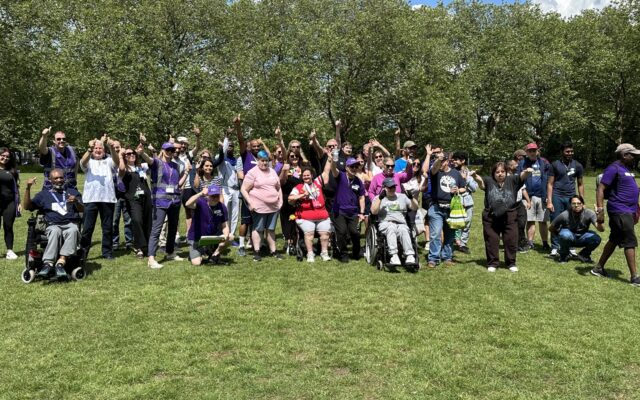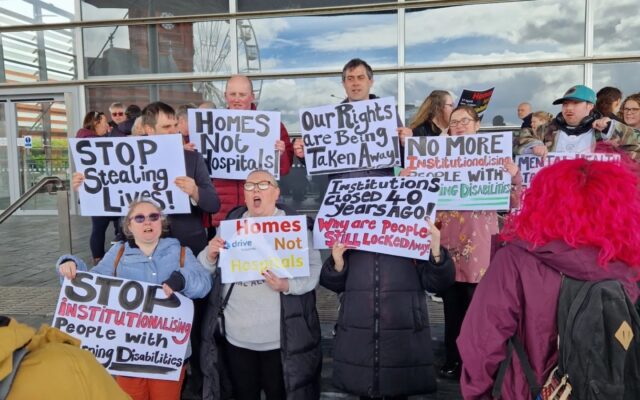A coalition of campaigners has come together to put pressure on the government to end assessment and treatment scandals once and for all. Isabelle Garnett reports
Ten years have passed since BBC Panorama shed light on horrific human rights abuses at Winterbourne View. This documentary prompted the government’s promise to “make homes not hospitals” happen for people with learning disability, autism or both living in inpatient units.
In May last year, Panorama yet again exposed mistreatment and abuse in an inpatient unit, this time at Whorlton Hall. Sadly, these revelations are not isolated incidents. They are echoed in numerous cases covered in the media, including in Community Living (see box, opposite page). In a decade, what has changed? The answer, appallingly, is not enough. NHS England’s Transforming Care programme, which aimed to make homes not hospitals a reality for people with learning disability and/or autism, came to an end in March 2019, missing the t argets it had set itself.
argets it had set itself.
As you read this, there are still more than 2,000 people with autism locked up in mental health units, with an average length of stay of more than five years. Ten years on from Winterbourne View, children, young people and adults with learning disability and/or autism continue to be denied their rights to a home and family life. These are basic rights that are vital to any human being’s physical and mental health. The coronavirus-related restrictions have increased the risk of people reaching crisis point and going into secure care. It has caused further delays to people moving out from institutions into homes of their own. Inside these institutions, people are more isolated than ever from their family, friends and advocates.
In June this year, the parliamentary Joint Committee on Human Rights (2020) raised concerns about restrictions on people living in institutional care and their families. The chair of the committee, Harriet Harman MP, said: “Even in normal circumstances, there is not sufficient protection against abuse of young people with autism and/or who have learning disabilities who are at risk of abuse.
“But the risk is even greater under lockdown with parental visits banned in some institutions and without routine inspections… There’s always a danger to vulnerable people in closed institutions. The Covid-19 lockdown increases that danger and the government must recognise it and take action.”
Self-advocates aim for change
In the wake of these events, a group of concerned self-advocates got together and discussed what they could do to bring about change. As self-advocate Aisha Edwards explains: “Stuff like this shouldn’t have happened in the first place and we don’t want it to happen again. Imagine if it was you. You wouldn’t be happy.”
The group of self-advocates reached out to other organisations and campaigners. Edwards explains how it was important for her “to get everyone’s opinion on it and how they feel about it… so that everyone’s voices are heard”. And so, the #right2home campaign began, bringing together self-advocates from across the country (Bemix, Lewisham Speaking Up, Pathways Associates and Sunderland People First), organisations (Learning Disability England) and individual campaigners, including Mark Brown of #RightfulLives, Leo Andrade of #StrippedOfHumanRights and myself of #HumanToo
Five days of action
#right2home’s first action was to run a five-day social media campaign in the week beginning 18 May, illustrated with memes showing photographs of people saying what #right2home means to them.
Each day had a different theme:
● Day 1. We must remember In the middle of everything that is going on, it’s easy to forget what happened at Whorlton Hall
● Day 2. It’s about human rights People with autism and/or a learning disability have the same rights as everyone else but they are denied them. That is not right in our society
● Day 3. It’s about homes People shouldn’t live in hospitals – what they need are homes
● Day 4. It’s about what people want Change the system so that people can have ordinary lives and contribute to their communities
● Day 5. What can we do? Don’t forget those people still locked away – don’t forget their families.
The five days culminated in the #right2home self-advocates meeting with NHS England head of learning disability Ray James and his colleagues. The aim was to keep the pressure on the authorities to move people from secure units into safer environments in the community where they can receive the right support and care. Marsh Stitchman, self-advocacy coordinator at Lewisham Speaking Up, stressed the urgency of this: “These places actually do people damage. They come out worse than when they went in. People are traumatised… it just draws people into further crisis and feeling like they’re cut off from [others].”
At the meeting, self-advocates outlined their concerns that people continue to be at risk of abuse because providers of secure care have too much power over residents, being with them day and night. They welcomed NHS England requesting commissioners to visit secure hospitals every six weeks (for under 18s) and eight weeks (for adults) but said more was needed to protect those in secure units, specifically the following:
● Peer advocacy in addition to independent advocacy – it is well recognised that people can relate more easily to someone with lived experience like theirs
● Safeguarding training for people in secure units so they understand if they are being abused or neglected and what they can do about it
● Self-advocacy training so people are more confident to speak up if they are being abused or neglected.
The #right2home self-advocates stressed that people who have moved on from secure care should be involved in delivering this support and training, not only because of their lived experience but also to help with their own recovery and wellbeing.
Still waiting
After the meeting, Edwards said: “I hope that people will listen to us and that we get our point across in the best and most efficient way possible.” Edwards acknowledges that “some important points were made”. However, at the time of writing, the self-advocates are still waiting to find out what, if any, of their proposals NHS England will commit to.
On the same day, other #right2home self-advocates met with Lewisham MP and shadow minister for disabled people Vicky Foxcroft to explain their concerns and recommendations for positive change. They sought her support for the #right2home pledge and she was the first MP to sign it. The #right2home campaign continues until, as Edwards puts it “everyone is out in the community, living where they are supposed to be living and not stuck in one of those institutions”.
#right2home wants to link up with other campaigners and needs your support. As Edwards explains: “Change isn’t going to happen overnight as we all know but it just needs drumming in more to the bigger bosses about what we want to see”.
● https://right2home.uk/
Twitter @right2homeUK
Facebook @ right2homeUK
Isabelle Garnett is a parent and campaigner for ‘homes not hospitals’ for those with autism and learning disabilities#
The #right2home campaigners
● Pathways Associates – community interest company: www. pathwaysassociates.co.uk
● Lewisham Speaking Up – self-advocacy group: www.lsup.org.uk
● Sunderland People First: http:// sunderlandpeoplefirst.com
● Bemix – self-advocacy group in Kent: www.bemix.org/self-advocacy
● Learning Disability England: www. learningdisabilityengland.org.uk
● Stripped of Human Rights – campaign group: www.facebook.com/ strippedofhumanrights
● Rightful Lives – campaign group:
● https://rightfullives.net
● Human Too – campaign group
● https://humantoo.net
References
Joint Committee on Human Rights Report (2020) Coronavirus has left young people in detention facilities highly vulnerable to Human Rights abuses. https://tinyurl.com/y7fqs9bw





